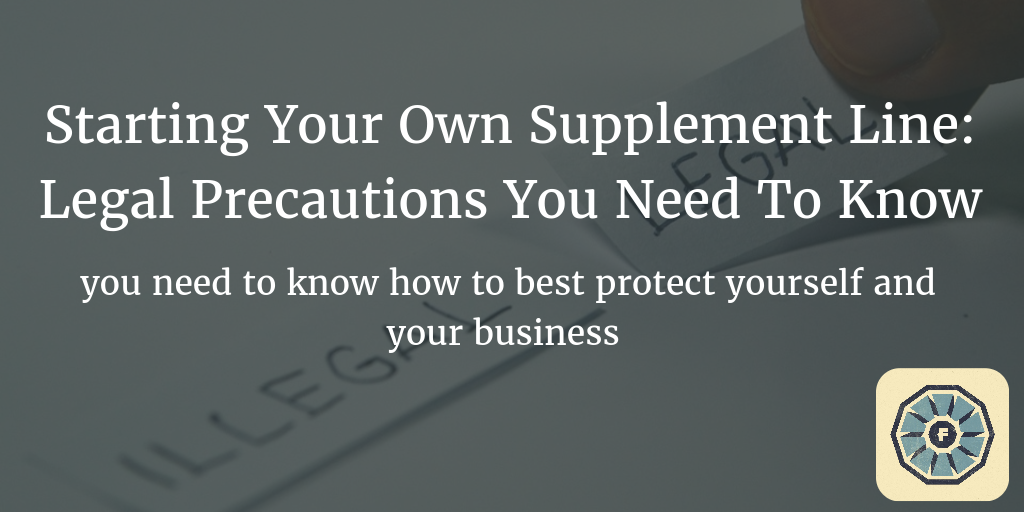Starting Your Own Supplement Line: Legal Precautions You Need To Know
Understanding the legal stuff behind starting your own supplement line.
There are a ton of articles that pop up when you google search “how to start a supplement company”, but they are often what I consider incomplete resources that only tell you a small bit of information without linking to another article or resource to finish the process.(mine included) They will usually tell you how to get the stuff made, packaged, distributed to you and then a potential tip or two on how to correctly market your new product to the audience you are looking to reach. This might sound like everything you need, but it isn’t, you need to know how to best protect yourself and your business from any legal issues that might come up related to your new products. None of the resources that come up in your “ start a supplement company” google searches will tell you that until now.
Now, I am not an expert in this field so I had to seek out the information from an attorney that works in the field. Thats where I found David Torreblanca of CGMB Supplement Counsel. David has been working as part of this nationally recognized team of experts since 2013/14 and has first hand experiences working with new and up and coming brands looking to make their mark in the supplement space.
I asked David some questions that I know you will find useful because he knows his stuff.
* FITLETES.com does not provide legal advice. This material below has been prepared after discussion with David Torreblanca of CGMB Supplement Counsel, and is for informational purposes only, and is not intended to provide, and should not be relied on for legal strategy or legal advice. Should you be looking for legal advice in relation to starting a supplement company you may contact the attorneys at supplementcounsel.com or by choosing your own legal counsel.
Now Let’s Get to the Good Stuff
What is the most popular theme of your typical caseload?
One of the pieces that most lay persons and supplement entrepreneurs forget is that this industry is an ever changing one, and you might need to be coached in the right direction to safely align your brand within the red tape of the regulations. (aka the main reason I chose to get this information together)
“Compliance is big part of what we do on a day to day basis…”
I know you might be asking what the hell compliance means so here are somethings your legal counsel might handle for you, and some areas you might need to think about when developing your products to brand:
Ensuring you have correct licenses/registrations; if any are needed.
Checking the regulatory status ingredients according to FDA guidelines. aka which ones you can use and which ones you can not.
Reviewing Marketing claims you make about the products as a whole and the ingredients within the products.
Reviewing claims that are made on the labels. Making sure that you are not making “disease claims”
You also need to think about and analyze how the product should/would be classified by the FDA as well. As the brand owner you do this the same way that the FDA would by reviewing ingredients, claims made about said ingredients on packaging, and the terminology you use in marketing. This is important because if you intend to be classified in one area, but the FDA classifies you in another there can be some problems for you in maintaining your products and branding. (and maybe even some regulatory troubles…yikes)
It’s often overlooked, but you need to make sure you fall in line with FTC regulations by making sure you have competent & reliable scientific evidence before making any specific or implied claims within your advertising campaigns.
You should get your manufacturing contracts drafted or reviewed by an attorney. Some manufacturers will supply them for you and others will request you have one drafted by an attorney. David said “In either case you should be sure to have an Indemnification Clause(IC) which indemnifies you from any defects, contamination issues, etc where the manufacturer is at fault.”
David mentioned that his firm “can also assist with any FDA/FTC warnings, notices and investigations, ingredient bans, market recalls, trademark violations, and if there are any lawsuits against you.” While I do not know if this is the case with most firms, it is probably a smart idea to find legal counsel that has experience in the area which you are seeking representation.
Is using stock formulas/mixtures provided by a manufacturer a safer business choice over creating my own custom formula/mixture?
David says that it depends. It seems this is more of a choice for the brand owner, and doesn’t have any safety for the business inherently baked into the decision. However, there may be a higher chance that stock formulas offered from the manufacturers have gone through a selection process to make sure they are compliant with various regulations, include legal ingredients, and contain ingredients in amounts that have some sort of basis to make certain claims on the bottle and in marketing materials. But that will depend on the manufacturer and formula as no two are the same and you should not assume so either. A legal review of these elements is always recommended before you move forward with product development. Some companies that I listed in my other creating a supplement line article seem to try making it as easy as possible to get products branded for you, but you should still take the extra time and perform some due diligence for your own sake.
You can use your own custom formula or ingredients if you wish (but keep in mind that manufacturing contracts often have you indemnify the manufacturer for any issues with your product formula). David said “You should be sure your formula is in compliance with the DSHEA, including the New Dietary Ingredient regulations (NDIs) if you are choosing a formula.” Generally, dietary ingredients marketed for use as dietary ingredients in the U.S. before the passage of DSHEA from 1994 are “grandfathered” into compliance under the NDI regulations. Many new dietary ingredients that came to market after 1994 would be required to have a new ingredient notification submitted to the FDA before use in products. FDA can pursue you if you don’t provide the proper notice. David also mentioned “If you are using basic popular ingredients that are widely used in the market already — calcium, whey protein, vitamin D, etc. — usually you are pretty safe, but it is always good to have it checked out before you move forward in the manufacturing process.”
Bottom line regardless which option you choose is you still need to do your due diligence even though it might be a step you assume the manufacturer has taken care of.
If a Batch of products is found to contain contaminants is the manufacturer held liable or the brand doing the private labeling. Would the end consumer typically seek damages from me or the manufacturer?
“Most personal injury plaintiffs will file suit through the whole channel of distribution (IE. Retailer, Distributor, Wholesaler, Manufacturer, and Brand Owner).”
David suggests a really great way to further protect yourself, and your brand from errors that are strictly the responsibility of the manufacturer — for instance, if the manufacturer doesn’t make your product in accordance with product specifications or applicable laws, or if the product is contaminated during its manufacture. David said “it’s really important to have a strong Indemnification Clause (IC) in the contract manufacturing contracts you sign…” They will be a strong way to protect you, and these IC’s typically run in both directions to protect you from manufacturer mistakes and vice versa to protect them from your mistakes. They are not always standard in the terms of service of the contracts, which is why it makes sense to have yours reviewed by some legal counsel before moving forward with your products.
How do I best protect myself outside of an IC; do I need product liability insurance?
David thinks it makes complete sense to get liability insurance and mentioned “…it doesn’t cover everything, and there are many exclusions, but it adds a layer of protection to your brand.” Also make sure you get all labeling reviewed legally before going into production to avoid any labeling issues. If you have your labels mocked up already and think you are in compliance, a label review can be very quick and painless. David also said “The headaches that can come from a label claim issue are way more of a pain later on”, which is another reason you are going to want to get these things taken care of before taking the next step.
If the manufacturer offers stock label templates should you trust they are ok, or have the labels legally reviewed outside of the manufacturer review?
David Said “Yes, you should have them legally reviewed, while the blank template might be ok in terms of formatting and basic content, any of the additional label claims you make on the label will not be subject to the manufacturer’s review process.” Some manufacturers have robust review processes while some we have seen to be lacking. Either way, a legal review in the beginning can save you time and money in the long run by catching both minor (or major) errors on labels. Remember, due diligence is important.
Should I avoid manufactures that only produce “proprietary blends” and why?
Proprietary blends are a hot button topic in our industry. The topic has been written about on quite a few occasions Here, Here, Here and most recently Here; which is why I found it important to ask. While David acknowledged that proprietary blends often get a bad rap, he doesn’t believe manufacturing companies that offer proprietary blends are inherently bad. “More important is whether the manufacturer follows Good Manufacturing Practices (GMPs) at their facilities, and that the ingredients declared on the label are present in the bottle — nothing more, and nothing less. While some see it as less “transparent” to have a proprietary blend, it is not illegal or considered bad business practice for the brand or the manufacturer to have one.” If you are ever questioning that the manufacturer might not uphold labeling or manufacturing regulations with the stock proprietary blends they offer or with your own custom blends, then that is worth investigating. Proprietary blends in themselves, less so. Also, if you work with legal counsel before solidifying a relationship with a manufacturer then they might be able to find any red flags for you so you can hopefully avoid situations where the manufacturer isn’t doing what it’s supposed to.
Could The FDA warn me about my products even though manufacturing is not done in house?
David says “Yes, they absolutely can, and will, if they see due cause to do so! FDA typically holds the brands that market the products responsible for their product issues, not their manufacturers.” At the end of the day it is your responsibility as the brand to make sure you are compliant with any regulations that you might be held accountable for while building a brand, private labelling, contract manufacturing, contract review, FDA/FTC regulations etc. David said “brands can’t “contract out” their responsibilities under the law, which is why it is helpful to work with legal counsel.”
How does someone new to this industry understand what good manufacturing processes are and how to look for them.
If a new brand is using a contract manufacturer, most of the heavy lifting will be on the manufacturer’s side. The brand is ultimately responsible, however, so it should work closely with its manufacturer and regulatory counsel to make sure all requirements are being met. David said “It often helps to have a contract with the manufacturer, and the contract can also address who is responsible for what in terms of GMPs. Working with legal counsel who can audit the manufacturer’s standard operating procedures, facility, etc. can also be a big help.” At a minimum, brands should have access to master manufacturing records and batch production records — FDA will want to see them if it comes knocking.” You can always look for yourself and compare that to the information that the FDA has made available here.
Does domestic ingredient sourcing have a significant effect on quality of ingredients.
David says that “domestic US supplements are not necessarily better than foreign sources.” It often depends on the type of ingredient you are looking to use, in fact there are a lot of ingredients widely considered high quality that are sourced from overseas; like botanical ingredients that come from China. An example of a more performance based supplement ingredient would be looking at Creapure, a creatine monohydrate widely considered high quality and in very popular brands already. It is produced in Germany.
Should a new brand send their products to 3rd party certifying companies as a method of protection on their product?
David thinks yes for marketing, also to an extent for brand protection purposes. For instance, some companies will test your products to make sure they don’t contain banned substances. David said “Catching accidental contamination before going to market can save a lot of money in recall fees” These certifications can also help you market your products to a specific audience or demographic. If you market to collegiate athletes who get tested for banned substances then it would be in your best interest to make sure your products are free of them, and having a 3rd party certification from a companies that tests for them would assist with your marketing efforts to this audience.
What’s some general advice you would give to a personal trainer or small gym who wants to brand supplements to market to their own clients?
David believes “first, and foremost, that anyone starting a supplement company should get legal counsel to help them through the process. Regardless,if you don’t know how to start, do your own research with the ingredients that will be in your products so you know how you can label and market them appropriately, and pick a manufacturer that is reputable and can do what you need them to do. Even though they might only be supplying their own clientele with the products they still need to follow the same regulatory and compliance guidelines that any other brand would.”
BULLET POINT FINAL WRAP UP
Work with some legal counsel to make sure you get everything the way it should be the first time around.
Understand the FDA/FTC guidelines, regulations and restrictions
Get the highest quality ingredients from wherever they are highest in quality.
Make sure you have Manufacturing Agreements with indemnification provisions when working with a contract manufacturer.
Get Liability Insurance for sure.
Get your labels reviewed by a third party
Proprietary blends may not be “transparent,” but they also are not illegal or bad business all the time.
Do some research when working with a manufacturer and make sure they follow GMP’s.
If you do get a warning from the FDA or FTC get legal help ASAP.
Please feel free to contact David Torreblanca with any questions you may have about dietary supplement regulations. He can be reached at: DTorreblanca@SupplementCounsel.com | Visit Supplement Counsel
Originally published at fitletes.com

Thanks For taking the time out of your day to read.
If you enjoyed it then I hope you follow, It would really mean the world to me.




